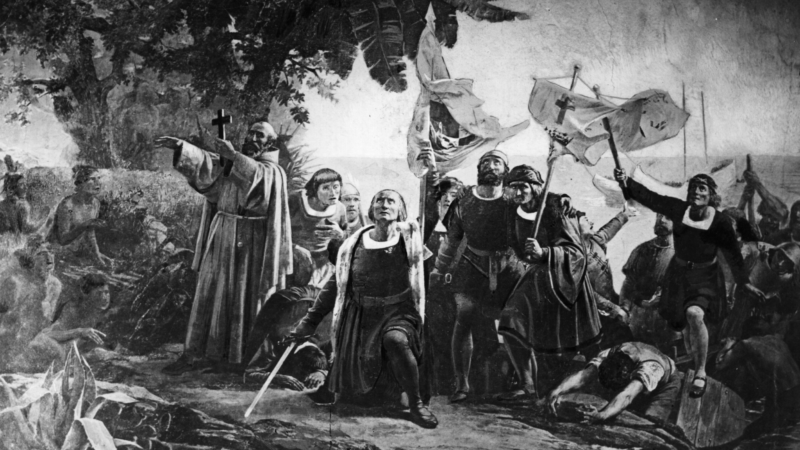Hakeem Jeffries could be the first Black speaker of the House. First, he needs to win

House Minority Leader Hakeem Jeffries is crisscrossing the U.S. campaigning to help Democrats retake control of the House of Representatives. If that happens, Jeffries could make history as the first Black speaker, but it’s not something he is ready to talk about yet.
Instead he’s warning voters that the future of democracy and basic rights, like the right to vote, are at risk under a Washington controlled by Republicans. And he’s saying that if House Democrats win the majority, they will protect those rights but also move legislation that addresses the economic squeeze that voters are still feeling.
At Greater Shiloh Church in Easton, Pa., Jeffries told a group of church and community leaders what it was like being on the House floor on Jan. 6, 2021, and argued that voting rights are on the line in November.
“We have to be prepared to fight for our democracy,” he said. “Those are the stakes.”
Ticking through the history of voting rights, Jeffries notes that Republican presidents four times signed bipartisan updates to the landmark Voting Rights Act, but says that something changed when the country elected Barack Obama, the first Black president.
“I’m in a church, so I’m trying to be polite for some reason,” he told the group. “All of a sudden, in the aftermath of the 2008 election, this notion of voter fraud was invented as a concept. No evidence of voter fraud has been produced in a manner that suggests that it has altered any election of consequence.”

Jeffries told NPR in an interview at the church that this is “a fragile moment for our country.”
He says Democrats are prepared to certify the election results in January under their constitutional duty, but “it’s not clear that many of my right-wing extremist colleagues in the House Republican Conference are prepared to certify the results of the election if the American people elect Kamala Harris as the next president. That’s quite unfortunate.”
Jeffries said the issue of democracy is central to the race that he’s in Pennsylvania to support. Rep. Susan Wild is in a tight race with Republican Ryan Mackenzie in a district that has become a top-tier target for both parties.
“You have an election denier, as a matter of fact, running as a Republican candidate in the 7th Congressional District,” Jeffries said.
Wild stresses that Northampton County is crucial to her race and also historically determines who wins at the top of the ticket, telling her constituents, “You all pick the president, every single time.”
Jeffries told NPR that Democrats have already demonstrated they can govern during a chaotic period, like when House Republicans were split and his party helped avoid government shutdowns and a debt default. Pressed about what Democrats could do if the Republican Party recaptures the White House and the Senate, Jeffries says Democrats know how to work in divided government but can do more if they run the House.
“We will build upon that bipartisan track record of success in the next Congress, but will be in the strongest possible position to deliver real results for the American people as House Democrats if we’re given the opportunity to serve in the majority.”
During the discussion in Easton, Jeffries contrasted what Democrats would do by name-checking the conservative plan drafted by Trump loyalists.
“What’s at stake in this election? When people ask me that question, I say, ‘Do you want progress for the people or Project 2025?'”
A chance to make history as the first Black speaker of the House
Jeffries may be campaigning to make history, but like Vice President Harris, he leaves it to others in his party to point out he could break new ground.
He waves off questions about a potential historic rise to be the first Black speaker of the House, saying he has learned “never to put the cart before the horse.” Democrats need to pick up a net of four seats for Jeffries to get the gavel, and both parties expect whoever wins will preside over a narrow majority.
Members of the House Democratic Caucus will vote on leadership slots after the election.

But Jeffries quotes a civil rights icon and former House colleague, the late Rep. John Lewis of Georgia, about his focus.
“It’s been clear to me from the very beginning of this journey, in this position, that I have to keep my eye on the prize, as John Lewis always instructed us to do, and keep the main thing the main thing, which at this moment, as we approach the election, is taking back control of the majority so we can deliver for the American people.”
Housing issues top agenda for Democratic majority
Jeffries and other House Democratic leaders have not rolled out a detailed policy agenda to show voters what they would do if they are in charge. But Jeffries has signaled some items he’s putting at the top of his list. He told the church leaders in Easton that he plans to put a voting rights bill named after Lewis on the House floor if he gets the gavel. He has also pledged to move a bill that protects reproductive health care rights.
But Jeffries told NPR that Democrats need to address pocketbook issues.
“We’ve got to make sure that we’re focused on housing prices, food prices, gas prices, as well as health care costs, as major drivers of the expenses that everyday Americans confront.”
He repeatedly notes that everywhere he goes in the final weeks before Election Day, voters say housing costs are their top concern.
“It’s time for us to get back into the business of promoting and creating and preserving affordable housing,” Jeffries says.
He points out that Harris has proposed policies to address the housing crisis. “This is the first presidential campaign, in my recollection, that has centered affordable homeownership and housing opportunities for everyday Americans as part of their vision for driving down costs and creating opportunity.”
Control of the House could hinge on a few districts like Wild’s in purple Pennsylvania, but a lot is riding on Jeffries’ ability to oust Republican incumbents in his home state of New York, where a wave of victories in seats in suburban areas outside New York City in 2022 helped Republicans win their narrow majority.
Jeffries has teamed up with other Democratic leaders in the state, but many of those races remain close. He argues that Republican candidates are out of step with voters in those districts.
“The Republicans in New York and beyond, who pretend to be moderate, spend their time in Washington, D.C., voting with the extremists and doing things like try to criminalize reproductive freedom and a woman’s ability to make her own health care decisions.”
Jeffries campaigns in competitive districts
During the final weeks of the fall campaign, Jeffries has raised money and stumped for Democratic incumbents and challengers in Oregon, New Mexico, Ohio, Pennsylvania, California and New York.
The battle for the House is being waged on a relatively small map — fewer than 25 seats are designated as “toss up” by the Cook Political Report, a nonpartisan election analysis site. On the same day Jeffries traveled across Wild’s district, House Speaker Mike Johnson campaigned for her Republican opponent.
Jeffries, 54, was elected the first Black person to lead a political party in Congress in 2022, when then-Speaker Nancy Pelosi, now 84, announced she was stepping down from leadership. He had big legislative and political shoes to fill. Pelosi is regarded as a master legislator, political strategist and record-breaking fundraiser. But in purple districts she could be polarizing. Republican candidates and challengers spent hundreds of millions of dollars over several election cycles splashing her image in campaign ads that linked Democratic candidates to her in contests like the one in Wild’s district.

Wild told NPR outside an event with campaign staff in Williams Township, Pa., that Jeffries understands that her district is worlds apart from Brooklyn. And she said that unlike other high-profile Democrats, he can campaign anywhere.
“There are clearly some that probably wouldn’t — I wouldn’t necessarily want to have in the district because they’re either divisive or just seen as too far afield in terms of Middle America, but not Hakeem. He very much understands Middle America.”
Wild also credits his bottom-up leadership style as an asset, saying he listens to each member of the caucus and doesn’t try to impose on others. She recounted that during the period after President Biden’s poor debate performance in June against Republican presidential nominee Donald Trump, Jeffries met with every single House Democrat and didn’t let on what his own views were about nudging Biden out of the race. “He gave everybody there the right and the ability to say what they were thinking and what their districts were thinking.”
If Jeffries gets the chance to serve as speaker, he’ll face the same pressures that Pelosi faced working to bridge significant ideological splits between progressives and moderates.
He told church leaders in Easton that he thinks about the advice Lewis gave him when he first met him as a freshman in 2013, which he believes applies to this moment.
Lewis told him more than a decade ago: “Washington, D.C., can be a tough place, so I don’t want you or anyone else who’s new to get into any trouble — unless it’s good trouble.”
‘Cheat Code to Life’: Jailhouse lawyers help incarcerated people—and themselves, too
A new trove of letters and oral histories is shining a light on the successes and challenges of jailhouse lawyers: people in prison who help themselves and others navigate the legal system.
Archaeologists discover 12 skeletons at a buried tomb in Petra, Jordan
The Treasury in Petra, Jordan, is a famous tourist site and features in an Indiana Jones movie. Now archaeologists say they've found a remarkable 12 complete skeletons in a hidden tomb beneath it.
Swing state map: Polls move in Trump’s direction, but the race remains tight
The polling averages show Vice President Kamala Harris’ lead has dropped in every swing state in recent weeks.
Christopher Columbus may have been a Spanish Jew, according to a new documentary
A recently televised documentary in Spain rekindles competing versions of the famed explorer's origins, but the scientific community is viewing it with caution.
Small business disaster loan program is out of money until new funds are approved
The SBA’s disaster loan program has run out of money, it announced on Tuesday. The agency expects to receive new funding from Congress, and will continue to accept applications in the meantime.
In Michigan, Arab Americans weigh the power of a vote
We travel to the swing state of Michigan — in order to speak to some of the most influential and misunderstood voters in the country: Arab Americans in Dearborn. The Dearbornites we met said that the war in Gaza is the key issue on their minds as they consider how to cast their ballots. What these voters ultimately decide could have huge consequences for the whole country.



